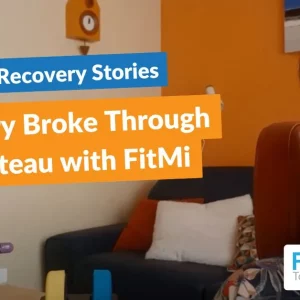Morning brain fog after stroke is more than just being groggy. Your body is awake, but your mind may feel heavy, unfocused, or slow to get going. For many stroke survivors, it can become a daily hurdle that makes mornings frustrating and recovery more difficult.
The good news is that you don’t need hours to start feeling clearer. Small actions, practiced consistently, can sharpen your focus and boost your energy in just ten minutes. This guide explores why brain fog happens after stroke, and shares practical fixes you can easily work into your morning routine to help you feel more alert, motivated, and in control.
Tap the links below to jump directly to a section:
What Is Morning Brain Fog After Stroke?
Why Does Brain Fog Happen in the Morning After Stroke?
Simple Fixes to Increase Energy and Clarity
Additional Tips to Reduce Morning Brain Fog Long-Term
What Is Morning Brain Fog After Stroke?
Brain fog is a term used to describe a mix of mental and physical symptoms such as:
- Slower thinking or trouble concentrating
- Difficulty remembering tasks or conversations
- Feeling groggy or “out of it” despite sleeping
- Heavy fatigue that lingers after waking
For stroke survivors, brain fog often comes from a combination of factors. The brain is still healing and may not regulate sleep cycles as smoothly as before, leading to poor sleep quality. In addition, medications and other factors can add to grogginess.
Why Does Brain Fog Happen in the Morning After Stroke?
Mornings tend to be tougher because your body and brain are shifting out of rest. For stroke survivors, this transition is often less efficient.
Some of the main reasons for this include:
- Interrupted sleep cycles: Stroke can affect deep sleep, leading to poor-quality rest.
- Circulation changes: Your brain may need more time to get blood flow moving efficiently in the morning.
- Medication timing: Some prescriptions cause drowsiness that peaks or lingers overnight.
- Mental fatigue: Healing brains often tire more easily, leaving mornings as the hardest part of the day.
Understanding these causes is the first step. The next is finding quick habits that can cut through the fog and prepare you for the day ahead.
Let’s take a look at some of our top recommendations!
Morning Brain Fog After Stroke: Try These 8 Simple Fixes to Increase Energy and Clarity
Having a strategy to deal with morning brain fog after stroke can set your whole day up for success. Each of these strategies takes just a few minutes but can make mornings feel lighter and more manageable. You don’t have to do all of them every day.
Try a few, see what feels good, and build a routine that works for you.
1. Start with Deep Breathing
Oxygen is fuel for your brain, making deep breathing an excellent way to enhance brain function. Slow, intentional breathing helps clear grogginess and signals your body to wake up.
Here’s how to get started:
- Sit comfortably and place a hand on your chest or stomach.
- Inhale slowly through your nose for a count of four.
- Hold for two seconds, then exhale through your mouth for a count of six.
- Repeat for about ten cycles.
This simple routine increases oxygen flow, reduces stress, and helps your brain feel more alert.
2. Drink a Glass of Water
Dehydration makes fatigue worse and slows down thinking. Because many people go 7–8 hours without water while sleeping, mornings are when hydration is most important.
Keep a glass or bottle by your bedside and drink as soon as you wake. Adding a slice of lemon can provide a refreshing boost as well.
3. Get Some Gentle Movement In
Even light exercise increases blood flow to the brain, which improves clarity. For stroke survivors, gentle movement is enough to activate both the body and the mind.
A few examples include:
- Shoulder rolls and neck stretches
- Seated marching in place
- Opening and closing the hands to wake up fine motor skills
- Standing (with support if needed) and shifting weight from side to side
Movement helps you feel grounded and ready for the day, even before therapy sessions.
4. Try “Brain Warm-Ups”
A short mental exercise can help knock off some of the cobwebs and sharpen your focus more quickly. Here are a few simple ideas that you can try:
- Count backward from 50 by threes
- Do a simple word puzzle or recall a grocery list
- Read a short passage out loud
- Repeat positive affirmations
Even small tasks build mental momentum, making the rest of your day easier to manage.
5. Step Into Natural Light
Light tells your brain it’s time to wake up. Exposure to natural light resets your body clock, improves alertness, and can even boost mood.
If possible, open your curtains first thing or sit by a window. If natural light is limited, a light therapy lamp can be an effective substitute.
6. Refresh with a Cool Splash
Washing your face with cool water or using a damp washcloth provides instant stimulation. The sudden change in temperature signals your nervous system to perk up.
Some survivors even keep a bowl of chilled water nearby to dip their hands into, which wakes up circulation while helping with sensory re-education.
7. Use Aromatherapy for Alertness
Certain scents stimulate the brain and create a sense of wakefulness. Essential oils like peppermint, citrus, or eucalyptus are especially energizing.
- Place a drop of oil on a tissue and inhale gently.
- Use a diffuser by your bedside or in the kitchen during breakfast.
- If you prefer, keep a small roller bottle in your pocket for an instant boost later in the day.
This simple sensory cue can help sharpen focus and lift grogginess without much effort.
8. Listen to Energizing Sounds
Sound has a strong effect on alertness. Listening to upbeat music, nature sounds, or even a motivational podcast can activate your brain more quickly than silence.
- Pick a short song you enjoy as a “morning starter.”
- Use headphones or a small speaker while stretching or preparing breakfast.
- If speech feels motivating, try listening to a podcast segment or an audiobook chapter.
Pairing sound with movement or breathing exercises can help you feel more grounded and ready to engage with the day.
Additional Tips to Reduce Morning Brain Fog Long-Term
Quick fixes help in the moment, but addressing the root causes can make mornings smoother overall.
Improve Sleep Hygiene
Sleep hygiene recommendations may include:
- Stick to a consistent bedtime.
- Keep your bedroom cool and quiet.
- Avoid screens for at least an hour before sleep.
Talk to Your Doctor About Medications
Some prescriptions cause drowsiness. Ask if adjusting the timing could help reduce morning fog.
Build Rest Into Your Day
Post-stroke fatigue often means you’ll need short rest breaks to recharge. Pacing yourself can prevent mornings from feeling impossible.
Keep Track of Patterns
Use a journal to record when brain fog feels worst and what helps. Over time, you may notice triggers you can avoid and strategies that work best for you.
Final Thoughts
Morning brain fog after stroke may feel discouraging, but it doesn’t have to control your day. With just a few minutes of intentional activity, you can lift the haze, feel more alert, and set yourself up for success.
Healing is a journey, and clarity often comes in small steps. By practicing these quick fixes, you give your brain the support it needs to move forward.
Key Takeaways
- Morning brain fog after stroke is common, caused by a mix of fatigue, sleep issues, and brain healing.
- You don’t need hours to feel better—short actions like breathing, hydration, movement, and mental warm-ups can help in 10 minutes or less.
- Building a routine helps reduce daily frustration and sets a positive tone.
- Long-term improvements come from better sleep, pacing, and working with your healthcare team.
- Most importantly, brain fog is not a failure—it’s a part of recovery that can be managed with patience and practice.









